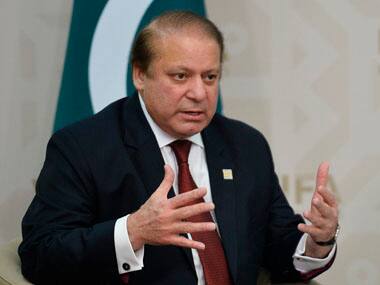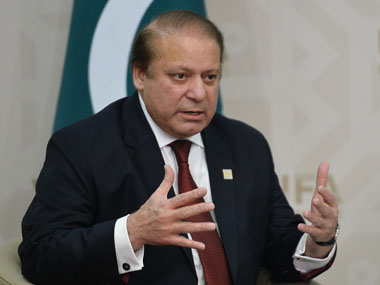It is unthinkable to believe that Pakistan Prime Minister Nawaz Sharif could have walked even a step, leave alone walking the whole distance, in having his first summit with Narendra Modi thirteen and a half months later in Ufa (Russia) on 10 July without the express permission from Rawalpindi, the seat of military power in Pakistan. He did. It is unthinkable to believe that Nawaz Sharif could have agreed to the language of the India-Pakistan statement, jointly read out by the two foreign secretaries, which looks like a draft by the Indian foreign office. He did. What does it mean? For the Pakistani civilian government? For the Pakistani military establishment? And for Pakistan on the whole? [caption id=“attachment_2338496” align=“alignleft” width=“380”]  Prime Minister of Pakistan Nawaz Sharif gestures while speaking during the SCO (Shanghai Cooperation Organization) summit in Ufa, Russia. AP[/caption] The India-Pakistan summit in Ufa is regarded as Indian diplomatic victory at the expense of Pakistan. It put on record several Indian concerns and made a specific mention of expediting the 26/11 trial without any reference to the K word. Nothing could be better than this for India! The question is: can this happen without the prior approval and blessings of Rawalpindi. It is highly unlikely. In fact, the likely scenario is that the Pakistani military establishment is firing the gun from the shoulders of Nawaz Sharif, knowing well that it is the credibility and image of Nawaz Sharif, not theirs, which is at stake. An Indo-Pak statement, jointly read out by the two countries’ foreign secretaries at a joint press conference is too good to be true, after all! But wait! What if it is a pre-meditated strategy of the Pakistani military establishment! First of all, let’s put under microscope the following India-Pakistan statement, read out by the two foreign secretaries after the Ufa summit. Here is the full statement. The Prime Ministers of Pakistan and India met today on the sidelines of the SCO Summit in Ufa. The meeting was held in a cordial atmosphere. The two leaders exchanged views on issues of bilateral and regional interest. They agreed that India and Pakistan have a collective responsibility to ensure peace and promote development. To do so, they are prepared to discuss all outstanding issues. Both leaders condemned terrorism in all its forms and agreed to cooperate with each other to eliminate this menace from South Asia. They also agreed on the following steps to be taken by the two sides: A meeting in New Delhi between the two NSAs to discuss all issues connected to terrorism. Early meetings of DG BSF and DG Pakistan Rangers followed by that of DGMOs. Decision for release of fishermen in each other’s custody, along with their boats, within a period of 15 days. Mechanism for facilitating religious tourism. Both sides agreed to discuss ways and means to expedite the Mumbai case trial, including additional information like providing voice samples. Prime Minister Nawaz Sharif reiterated his invitation to Prime Minister Modi to visit Pakistan for the SAARC Summit in 2016.Prime Minister Modi accepted the invitation. The last line of second paragraph which talks of the two sides agreeing to “discuss all outstanding issues” should be seen as including a discussion on the Kashmir issue which Rawalpindi views as a “core issue” and an unfinished business. One should not forget that here Pakistan has agreed to “discuss” all outstanding issues; it is not a blanket endorsement of the Indian policy. As for talks between chiefs of the chiefs of BSF and Pakistan Rangers, the two have been staying engaged anyway over the years and there is nothing new about it. For that matter, even the biggest announcement that the two sides’ National Security Advisors would be meeting to carry forward the talks, does it not suit Pakistan that India has not only agreed for talks but has also elevated the level of these talks as NSA is a notch higher than the foreign secretary? The only unexplained point is why the Pakistanis agreed to put in a reference to exp editing the 26/11 trial without any mention of the Kashmir issue. This is indeed a major concession from Pakistan to India and also a major give-away of the mindset of Rawalpindi. It is no secret that Pakistan Army today finds itself stretched beyond limits in fighting terror outfits within, irrespective of the fact whether these outfits are home-grown or not. Pakistan today is in dire straits economically and power outages across the nation are becoming not just an embarrassment but also a strategic issue for the Pakistan government. The Chinese offer of funneling in a whopping investment of $46 billion into Pakistan, much of it predicated on the proposed China-Pakistan Economic Corridor, has come in as a potential saviour for the country. The Chinese investment would be like snowflakes in an oven if the security scenario of the country remains as worrisome as it is today. Therefore, it is logical to think that China would like Pakistan to bury its hatchet with India for the time being. In a way, the CPEC and China’s offer of $46 billion investment in Pakistan, is a lifeline for Pakistan which can be threatened if Pakistan’s security scenario is not improved considerably in double quick time. This is the real reason for Nawaz Sharif giving concessions to India as reflected by the India-Pakistan statement mentioned above. Had Sharif acted like a hawk at his summit meeting with Modi in Ufa, he would have compromised Pakistan’s long-term national interests and trouble would have been brewing for him at home. One will have wait and watch for the reaction, if any, of the Pakistani military establishment on Sharif’s talks with Modi in Ufa and the India-Pakistan roadmap for near-term engagement. Next few days would be crucial how the Pakistani military establishment takes the post-summit statement read out by the two countries’ foreign secretaries which did not mention Kashmir but pointedly referred to the two sides agreeing “to discuss ways and means to expedite the Mumbai case trial, including additional information like providing voice samples.” But Rawalpindi is unlikely to rap Sharif because this is exactly what he was told to do. It looks quite probable that Pakistan Army is using PM Sharif as a bait in its engagement with India.
Had Sharif acted like a hawk at his summit meeting with Modi in Ufa, he would have compromised Pakistan’s long-term national interests and trouble would have been brewing for him at home.
Advertisement
End of Article
Written by Rajeev Sharma
Consulting Editor, Firstpost. Strategic analyst. Political commentator. Twitter handle @Kishkindha. see more


)

)
)
)
)
)
)
)
)



